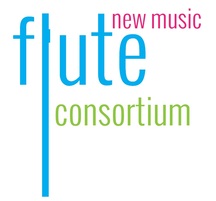Get to Know...Giordano Maselli 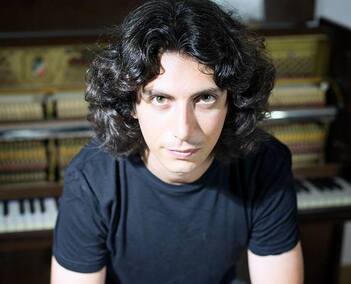 Are you looking for a lively and energetic quartet for C flutes for you or your students? Then, look no further than Kids Stuff by Italian composer Giordano Maselli! The winning work in the chamber music category in 2018, Kids Stuff, is charming with interesting lines for each part, it has a pleasing drive and sense of movement. It sounds like it would be so fun to play and is equally pleasing to the listener. Giordano is primarily a composer of music for film and television which is perhaps why Kids Stuff seems to tell a charming story. Despite the title, I picture young swallows flying about sometimes dipping and diving others soaring in a beautiful blue sky. Listen and see what it says to you. We're excited to listen to Giordano’s new flute quartet, Il Giardino Romano which was premiered in April 2019 and is dedicated to the exedra of Marcus Aurelius and his large equestrian statue! We’re also pretty curious about his arrangement of “Stairway to Heaven”….3 flutes, 3 recorders, this could be very interesting! I think we should be thanking his friends (see the first question below) for encouraging his interest in writing for flute! Q&A with Giordano What about new music for the flute appeals to you? I quite recently discovered flute repertoire thanks to Alchimie Sonore, a group of flutist friends. They introduced me to composers and music that was new to me, like R. Guiot and G. Briccialdi. I have worked with them in different ways, by both writing an original piece like Kids’ Stuff and arranging the world famous “Stairway to Heaven” by Led Zeppelin for three flutes in C and three recorders, for example. Other than writing for friends, it was an exciting experience to write for flute quartet because it was an unexplored world to me and as the repertoire is not vast it’s easy to write something new [laugh]. Who is/are your favorite “new music” composer/s and why? I grew up listening to John Williams’ music, so I cannot avoid mentioning his name. Even if it’s a simple-minded answer, he’s my favorite film composer, just like Thomas Newman who makes the best use of timbre layering/orchestration and sound design I ever heard. In addition to soundtracks, I also like the music of John Mackey, especially the piece called The Frozen Cathedral. I also like Eric Whitacre’s productions, he’s one of my favorite composers; Lux Aurumque is a masterpiece. What is/are your favorite “new music” piece/s and why? It’s definitely the above-mentioned The Frozen Cathedral by J. Mackey, it’s a majestic composition I studied during the symphonic orchestration & conducting course at the conservatory. I’ve always been attracted to it and even after hearing it hundreds of times it still gave me the chills. I think that Mackey has a strong descriptive capacity, his music is able to let the mind travel to distant destinations. Describe your musical background and current activities. My business is always divided between music for the concert stage and film (or television) music. My main activity is to work in the film industry and it gives me the opportunity to write a lot of original music and to be able to make it real. The score is the most powerful way to play with audience’s emotions, you can manipulate the plot by just putting the wrong music for the moment or you can reinforce or foreshadow the narrative developments. I’m currently scoring for an Italian comedy film, it’s such a great fun! The downside of film music is that you don’t have the creativity freedom you want and for this reason I love writing chamber or orchestral music for concert stage. Recently I’ve finished composing a piece for harp solo which has been recorded and it will be played for the first time live during the conservatory’s final exam of a harpist friend of mine. Then, I finished writing a new flute quartet piece dedicated to the exedra of Marcus Aurelius and his large equestrian statue. The premiere of the latter will be in April 2019, I wish you could listen to this soon! I have a special affection to a project called “Start from scratch”, it’s an album I’ve been working on for a long time which swings between soundtracks and concert music. It consists of eleven instrumental tracks composed by me and played by all of my musician friends, every one of them have put themselves into it and it was such an extraordinary experience. We are currently finalizing the mastering process and the cover art…It’s coming out soon! What instrument would you like to write music for next? I’d like to write something for recorders. How did you become involved with FNMC and what attracted you to the organization? I entered the composition contest in 2018. For a composer there is nothing more beautiful than listening to his own music played around the world, so thank you so much FNMC for your business and for the opportunity you gave to me and to my music. What advice can you give to flutists about approaching new music in practice? Probably it won’t be anything useful because I am not a flute player [laugh]. The musicians who approach the study of never heard music play an important role, my advice is to do it with all the passion that you have and to always keep looking at the original music because the world is full of wonderful undiscovered music that nobody has heard yet, so it’s your responsibility to bring it to light. [Editor’s note, we couldn’t agree more!] More About Giordano... Italian composer Giordano Maselli, earned a Bachelor of Arts Degree with honors in Classical Composition and a Master’s Degree with honors in Movie Soundtrack Composition at Santa Cecilia Conservatory of Rome. He started his musical training at the age of 3. After trying various instruments, he focused on the piano and scoring for visual media by the age of 9. He studied classical composition at the Arts Academy in Rome and privately with M° L. Pelosi, leading him toward admission to the Conservatorio di Santa Cecilia where he continued studying with M° M. Gabrieli focusing on film scoring. His compositions include some short movies like “Tom”, “Shah Mat”, “Adele”, “Cattive Notizie”, the complete soundtrack of the “Last Monkey” web series, cartoon soundtracks for the firm Musicartoon, and videogame scores with RedDoll. Maselli has a series of interesting collaborations in the YouTube universe in fellowship with Matteo Bruno (Cane Secco), a popular Italian blogger with whom he creates TV spots, short movies, soundtracks, event music, and music for the Internet. He has also worked with Video Eikon and Ballandi in several TV documentaries including the theme song of the Sky TV show “Itinerari di caccia”, “Morandi 7.1” featuring Gianni Morandi and with Pesci Combattenti in “Nessuno Può Volare”. In 2014 and 2015 he was awarded by Ian Anderson (Jethro Tull) the Best Original Score Award in the 48h Film Project. In 2015, he entered the Italian movie market with “Hybris”, a psycho-thriller produced by Mirelatives Picture. The movie has been released in Italy and the soundtrack is available on ITunes. As an orchestrator, he has collaborated with Riccardo Studer in several tracks of “Dylan Dog – Vittima degli eventi,” a fun movie directed by Claudio di Biagio. He has worked with Goblin on the track “Dark Bolero” and on the album “Fearless”. Maselli has also founded his own recording studio with the aim of working as closely as possible with other musicians in “live room” composing. He is currently working on an album named “Start From Scratch.” http://www.giordanomaselli.com/ If You Liked Kid's Stuff... Il Giardino Romano Instrumentation: 2 c flutes, alto flute, bass flute Date of Composition: 2019 Duration: 4:40 Stairway to Heaven (arrangement) Instrumentation: 3 recorders and three C flutes
0 Comments
Get to Know...Till MacIvor Meyn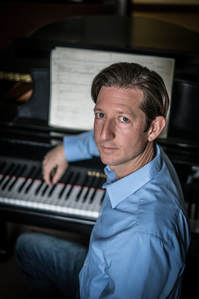 The flute and accompaniment category has traditionally been a category in which there are tons of really strong pieces and 2017 was no exception. We often find ourselves interested in performing all of the finalists works! Forces of Nature for flute and piano was a finalist work in this year’s flute and accompaniment category. Today, we’re featuring the composer, Till MacIvor Meyn! We were pleased to see that Till has more flute pieces available for us to play! Members with flute ensembles will be pleased to see he has three works for flute ensemble (a quartet and two flute choir pieces). There are recordings of Urban Ragas and Preludio Y Tango easily accessible on YouTube. His newest work, Nordic Spirits, which was premiered at NFA this summer is not recorded at this time, but we’re sure it will be recorded and posted soon! He also has a beautiful and accessible solo flute work Big Kahuna, there is a recording available on SoundCloud. We encourage you to check them out! Q&A with Till… What about new music for the flute appeals to you? New music for flute, as with new music in other genres, is really taking off today. By that, I mean that there are so many composers and new pieces out there now than there were a generation ago. Finding new music can be a very rewarding experience: You'll come across compositions that can touch you in a personal way, either through their lyrical qualities, their virtuosic elements, or combinations of those and other aspects. Happy hunting! Who is/are your favorite “new music” composer/s and why? I have many favorite living composers, and a varied musical palette of tastes. I find the music of Eric Ewazen to exhibit well-constructed melodies contained within classical-style forms that help us, as listeners, keep it all together. Frank Ticheli and Jennifer Higdon, though very different in style, are able to create dissonant, virtuosic passages that reside within tonal frameworks, and both composers write beautiful lyricism as well. Magnus Lindberg crafts monumental works with lots of jagged edges, but his music is goal-oriented, and so we have something to keep hanging onto. Describe your musical background and current activities. My own musical background is that of a singer, but as a composer and theory professor, I use the piano quite a bit as well. I grew up listening to classical music that my parents played in the home, and as I became a teen in the 1980s, I had a voracious appetite for rock and pop music. I was introduced to jazz through my choir in high school, especially the arrangements of standard tunes performed and recorded by the Manhatten Transfer. I believe that my exposure to all of these disparate genres made me the composer I am today, which is quite an eclectic mix of primarily tonal materials. What advice can you give to flutists about approaching new music in practice? My advice to flutists when approaching new music is to have an open mind. You never know what the next big thing out there will be (a composer, a style, a certain sound), and so it could be very rewarding to stretch your comfort zone a bit and work on something that you might otherwise not have tried. I also feel that communication between the composer and performer(s) is a very beneficial aspect of understanding the music; I enjoy Skyping with ensembles to work with them in rehearsal, which helps to bring the music to life--it's really fun for me and for the musicians! Do you have any upcoming events that you would like our friends and followers to know about? I have a new flute choir piece called Nordic Spirits which was recently premiered at the NFA Convention; my flute sonata (flute and piano) is called Force of Nature, and features a very modern sound with virtuosic and lyrical passages; I have a flute quartet called Urban Ragas which flute players tell me they enjoy, and I have a short tango called Preludio Y Tango for flute choir that really spices things up! I'm happy to hear from you about any of these pieces that you'd like to play. More About Till… Till MacIvor Meyn is Professor of Theory and Composition at Texas Christian University. He earned degrees from U.C. San Diego, Indiana University, and USC’s Thornton School of Music. Till’s music has had international performances in France, Italy, Cuba, China, Spain, Ukraine, and Slovenia. Performances of his music in the United States include those at Carnegie Hall (Weill Recital Hall); Clarinet Fest in Oklahoma City, MO and in Lincoln, NE; the Biennial Saxophone Congress in South Carolina; the Florida State University Festival of New Music; the SCI/CMS National Convention in San Antonio; the National Flute Association Conventions in Chicago, Washington, D.C., San Diego, and Pittsburgh; at the Manhattan School of Music; and at the Intercollegiate Men’s Choruses National Seminar at Harvard. Till was recently commissioned to compose a work for the Fort Worth Symphony Orchestra’s Kinderconcerts Series; he was a finalist in the Areon Flutes Commissioning Project for 2016; he was a featured composer at the 2015 Cliburn at the Modern series; he was a finalist in the NFA Newly Published Music Competition for ‘Urban Ragas’ (2013); and he earned first prize in the NACUSA Texas 2011 Composition Contest for Celestial Mechanics. Till’s music is published by Alliance Music Publications, GIA Publications, ECS Publishing, C. Alan Publications, and Alry Publications. He is a member of the Fort Worth Symphony Orchestra Board since 2015. For further information about Till’s music, please visit tillmeyn.squarespace.com or on Facebook: Composer Till MacIvor Meyn. If you liked Force of Nature… Nordic Spirits—9’15” 2 piccolos, 4 flutes, 2 altos, 2 basses The piece features various folk-like melodies reminiscent of Scandinavian tunes, with counterpoint and some effects. Self-published—please contact the composer at [email protected] Urban Ragas—7’45” 3 flutes, 1 alto (or bass) The work uses modal melodies that were inspired by North Indian ragas, woven contrapuntally. Published by ALRY Publications Force of Nature—14’00” Flute and piano This three-movement flute sonata has virtuosic melodies, as well as lyricism. The piano accompaniment is also very active. Self-published—please contact the composer at [email protected] Preludio Y Tango—4’00” 1 piccolo, 7 flutes, 1 alto, 1 bass This two-movement piece features a short off-kilter prelude, and then a romping tango movement. Published by ALRY Publications Big Kahuna--5’45” Solo flute The composition is reminiscent of Debussy in its use of scales; it tells the story of a wave-rider in high surf. Published by ALRY Publications Get to Know...Nicole Chamberlain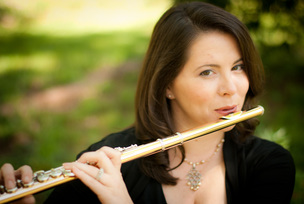 We’ve been very lucky that composers have shown a great interest in our competition and some have entered in multiple years. Several have even been finalists more than once. Among this group is Nicole Chamberlain. She was the runner-up in our inaugural competition in 2014 for her flute quartet, French Quarter. FNMC members have embraced it and performed it at the Florida Flute Fair, Kentucky Flute Fair, and Mid-Atlantic Flute Convention, among others. This year, Nicole’s work Asphyxia was voted an honorable mention in the solo flute category and Three Nine Line and Orion’s Belt were finalists in the flute and accompaniment and chamber music categories respectively. We first interviewed Nicole in 2014 when she was the runner-up and you can watch that interview on our YouTube channel, but we thought you might enjoy an update in this week’s Composer Spotlight. Q&A with Nicole… What about new music for the flute appeals to you? I love how flexible the flute can be. Once type cast as the bird, the flute has become more of a chameleon thanks to the wide use of extended techniques. Need a percussionist? Ok, use some beat boxing. Need a calliope? Multiphonics will do the trick. Wish you had a trombone? Try pitch bends. Want plucking, but no strings players? Flutes can pizz that! Who are your favorite new music composers? I have a long list, and I’ll try to narrow it down to categories. Valerie Coleman for chamber music, John Adams and Osvaldo Golijov for orchestral music, and Carlisle Floyd for opera. I’ve also been shaped by other composer’s approach to music like Jennifer Higdon’s own career journey through self publication, a life changing Joan Tower residency, and a chance encounter with Katherine Hoover about what my next step should be when composing. How can I not include my own composition teacher Dr. William Davis? What all these composers have in common is their unapologetic way of composing and running their own career. They write what they love, and run their careers the way it works for them. Describe your musical background and activities. Post graduate work wasn't for me, which means no job at a university. I've carved out a happy life as a flute teacher to many middle and high schoolers, composing for various ensembles and organizations, and catching gigs where I can. I work every week with Perimeter Flutes, and it’s the only ensemble I am currently active in. I decided this year to make some hard decisions and cut back my performance ensembles and other obligations to focus more on composing. So far, that has been a good decision. I enjoy performing, but I am being more selective. Sometimes I'll take a gig for financial reasons, or I will take it because it’s a rare opportunity. The ultimate goal, however, is to be composing more and get my stuff out beyond my immediate circle. What advice can you give to flutists about approaching new music in practice? As a composer and an active performing flutist, I’ve had experience being on both sides - sometimes both at the same time. My initial gut reaction about tackling a new piece is usually one of being overwhelmed and frustration. The first few practice sessions usually take research, communication with the composer, and patience. Once I get into the piece, I get excited about the piece. It takes time to make new friends, and that’s what a new piece of music is. So my advice is keep an open mind, try new things, and take risks. The great thing about new music is that it gets you out of your comfort zone. It’s all new, and that’s the point, but you only get better when you go beyond what you’ve performed/written before. Do you have any upcoming events you would like our friends and followers to know about? I am preparing a recital of me and my husband’s, Brian Chamberlain, music which will take place on October 29 here in Atlanta at the Eyedrum. It’s the first of a Composer Concert series hosted by Eyedrum. The concert is being called CHAMBERlain MUSIC, since all of the music is for chamber ensemble and composed by the Chamberlains. I will be performing all of the music, and some of the music will be the first time I’ve performed it, like Asphyxia. I will perform some solo works as well as pieces with Perimeter Flutes (we’ll perform French Quarter) and Two Shots Trio (a flute, clarinet, and bassoon trio). You can learn more about that event on my website: nikkinotes.com. More about Nicole… Nicole Chamberlain (b. 1977) is a composer and flutist living in Atlanta, GA. In 2010, Nicole won “Audience Favorite" at the Atlanta Opera's first 24-Hour Opera Project for her opera "Scrub-A-Dub Raw" which resulted in the Atlanta Opera's first ever commission of the children's opera, "Rabbit Tales", which received over 50 performances and kicked started her career as a composer. Nicole has also been commissioned by groups such as the Georgia Symphony Orchestra, Oklahoma Flute Society, Atlanta Flute Club, Flute Choir of Atlanta, Cuatro Puntos, Dahlia Flute Duo, Clibber the Jones Ensemble, and Hopewell Middle School Symphonic Band among others. She has had works performed at the 2013, 2015, and 2016 National Flute Association Conventions. She also won the 2013 Areon Flutes International Composition Competition, 2nd place in the 2014 Flute New Music Consortium Composition Competition, 1st place in the 2015 The Flute View's Composition Competition, and honorable mention in the 2016 Flute New Music Consortium Composition Competition Solo Category. Nicole received her Bachelor’s in Music Composition from University of Georgia where she studied with Dr. William Davis, Dr. Leonard Ball, Dr. Lewis Nielson and Dr. Roger Vogel and was selected for masterclasses with Charles Wuorinen and Joan Tower. Nicole, as a flutist, she has appeared with such groups as Georgia Symphony Orchestra, Gwinnett Ballet Orchestra, duoATL, Mercury Season, Terminus Ensemble, Chamber Cartel, Perimeter Flutes, neoPhonia, Bent Frequency, Capitol City Opera, and Orchestra Atlanta. Nicole has participated in Masterclasses with Bradley Garner, Paul Edmund-Davies and Dr. Gordon Cole. Nicole's former flute teachers have included Donna Orbavich (Hong Kong Symphony), Lisa Wienhold (Alabama Symphony), Dr. Ronald Waln (University of Georgia) and Atlanta Symphony Orchestra's principal flutist, Christina Smith. Currently she balances her time composing, teaching students, performing, and avoiding graphic design work as much as possible. Nicole lives in Doraville with her husband, guitarist and composer Brian Chamberlain. For more information visit her website: www.nikkinotes.com Nicole’s other works for flute… Nicole has 71 works for flute in various instrumentations. Learn more about them on her website: http://nikkinotes.com/CompositionsFlutes.html Get to Know...Carleton Macy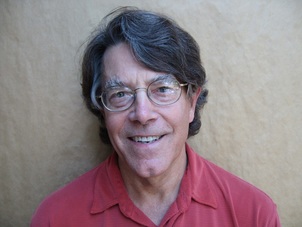 As you’re preparing for the new school year and choosing repertoire for your advanced student flute quartet (or your own!), we suggest checking out Carleton Macy’s wonderful work Intensity. An honorable mention in 2015, Intensity for four C flutes (amplified) is available for free download on his website! www.carletonmacy.com Q&A with Carleton… What about new music for the flute appeals to you? First, I am very drawn to the flute’s flexibility on so many levels: pitch range, textures, articulation, tone qualities, and extended techniques including some available only through amplification. Second, and perhaps most importantly, I am drawn to flute performers because they always tend to be very open to new music. Who is your favorite “new music” composer? When I am composing, my favorite composer is myself (of course!). Between compositions my favorite composers shift depending upon whose music has recently made the strongest impression upon me. The composers who come to mind now are Michael Gordon (and his recently completed work “Van Gogh”, Kevin Puts (especially his opera, “Silent Night”), and Silvestre Revueltas (a not so “new” composer) whose CD is in my car. My favorite new music pieces are always those that have found new ways to say the same old things. Describe your musical background and current activities: I grew up learning trumpet in public schools and then added trombone and switched to French horn because horn music was more interesting and more substantive when playing in an orchestra. I studied music ed, taught in Peace Corps (Ethiopia), and then went back to grad school to become a conductor and along the way I became a composer. I taught theory/comp and directed a jazz band at Macalester College for 35 years Along the way I learned to play Renaissance wind instruments, Baroque and contemporary recorder (mostly alto), swing and jazz drum set, and Chinese traditional instruments on which I performed with the Minnesota Chinese Music Ensemble. I am now retired from teaching but remain very active as a composer living in California, and once again loving performance on horn and bass drum (in a pipe band.) How do you view the composing profession? College faculty members are “required” to be professionally active which means actively seeking out juried performance and recording opportunities. Making real money composing would be wonderful, but the reality is that few composers can make more than a minimal honorarium and a small amount from ASCAP and BMI sampled performances. This may have bothered me at one time, but now I prefer to give my music away, which I do on my website: carletonmacy.com. On this site you may listen to and freely download pdfs of scores and parts for most of my music. A good performance of a new piece is the best pay! If a performer can get a grant to commission me, I’d be glad to share the wealth! What advice can you give to flutists about approaching new music. (1) expect to put in the same amount of time preparing a new piece that you would put into the preparation of a piece from the standard repertoire. Standard repertoire often gets more prep time because colleagues already know how it should be played, and thus performance expectations are higher. (2) Don’t hesitate to contact and consult with the composer. This is so easy to do now: send a recording of a run-through, even if recorded on one’s phone, or set up a skyped run-through. Most composers want to be involved with performance preparation. (3) Always commit to an expressive point of view in all of the music, new and old, that you perform….. and, of course, have fun while you are doing it! More about Carleton… I compose works ranging from vocal and orchestral to jazz and music for non-western instruments, often integrating a variety of historical and ethnic stylistic influences. My compositions have been performed throughout the United States, in Europe and Asia, and are recorded on INNOVA, Naxos, DAPHENO, and Latvian Radio. Macy’s Composition teachers have included William Bergsma, Robert Suderberg, and Donal Michalsky. I am a Professor Emeritus of Music at Macalester College where I began teaching in 1978. In addition to teaching theory and composition courses I directed the MacJazz big band, the Macalester Collegium Musicum, and the Mac New Music Ensemble which specialized in improvised music. I have an active interest in Non-Western music, having served as Artistic Director, conductor and sheng performer with the Minnesota Chinese Music Ensemble. I am presently an active composer living in Pacific Grove, California where I am also an active performer on French horn, alto recorder, and bass drum. If you enjoyed Intensity… A Little Fuguing Instrumentation: fl, ssax(cl), elec gtr, mar Duration: 5’ Year of Composition: 2006 Centering Instrumentation: double woodwind quintet and piano Duration: 20’ Year of Composition: 1984 Commentaries Instrumentation: fl, ob, cl, bn, hn Duration:14’30” Year of Composition: 1988 Concertino Instrumentation: fl, ob, cl, bn, hn, vib, mar Duration: 8’ Year of Composition: 1993 Douce Dame Instrumentation: Mez, fl, cl, pf, vn, va, vc Duration: 11’20” Year of Composition: 2012 Echoes Instrumentation: picc, 2fl, afl, 3cl, bcl Duration: 8’ Year of Composition: 2011 El Dia de los Muertos Instrumentation: fl, cl, pf Duration: 8’30 Year of Composition:2009 Equinox and Solstice Instrumentation: 2fl, pf Duration: 11’ Year of Composition: 1992 Flute Games Instrumentation: Mez, fl Duration: 12’30” Year of Composition: 1982 FMV Instrumentation: fl, va, man Year of Composition: 2006 Friends in Time Instrumentation: flute (amplified), elec gtr Duration: 8’15” Year of Composition: 1991 Mid-Summer Dreams Instrumentation: fl, cl, vn, va, vc Duration: 10” Year of Composition: 2006 Monogram: Alexander George Macy Instrumentation: solo flute Duration: 4’ Year of Composition: 1983 Opera Venti Instrumentation: fl, ob, cl, bn, hn Duration: 12’ Year of Composition: 1990 Shades of Green Instrumentation: fl, cl Duration: 4’10” Year of Composition: 2013 Three Flutes Quartets from Mozart Instrumentation: 3 fl, afl Duration: 9’45” Year of Composition: 1988 Toute Ensemble Instrumentation: 6fl (3rd dbl picc) Duration: 10’30” Year of Composition: 1978 Twigs: a Serenade for Woodwind Quintet Instrumentation: fl, ob, cl, bn, hn Duration: 13’ Year of Composition: 1980 Waves Instrumentation: fl, ob, bn, pf Duration: 10’30” Year of Composition: 1984 |
AuthorThe Flute New Music Consortium is an organization dedicated to the creation and support of new music for the flute. Archives
June 2019
Categories
All
|

 RSS Feed
RSS Feed
